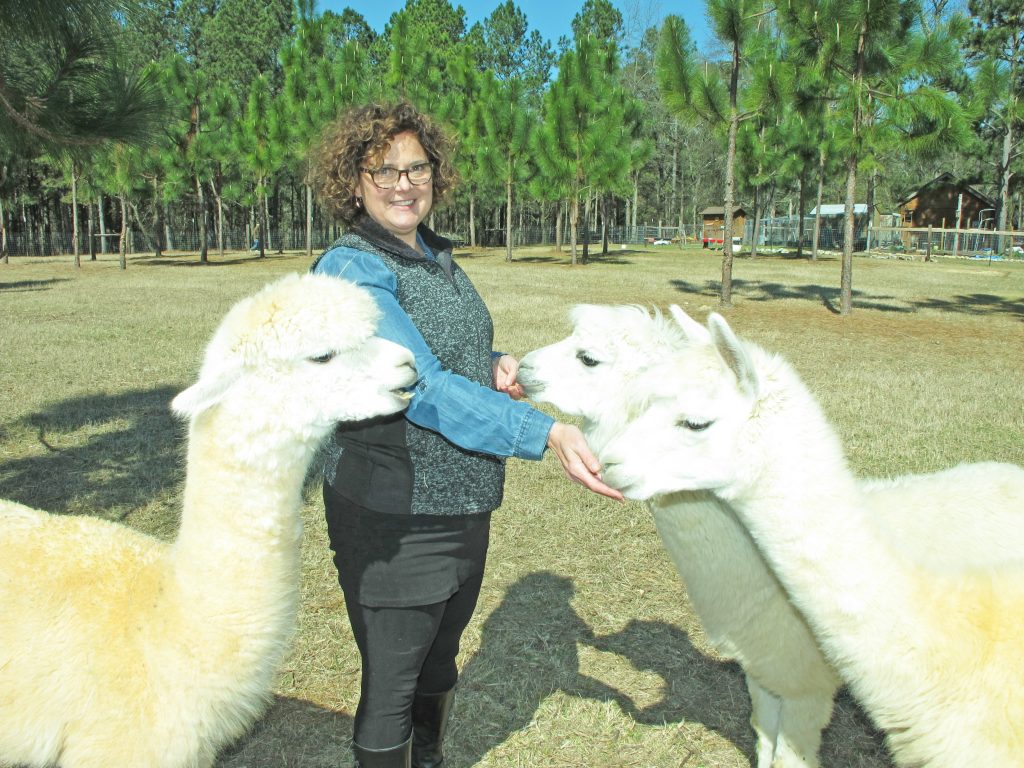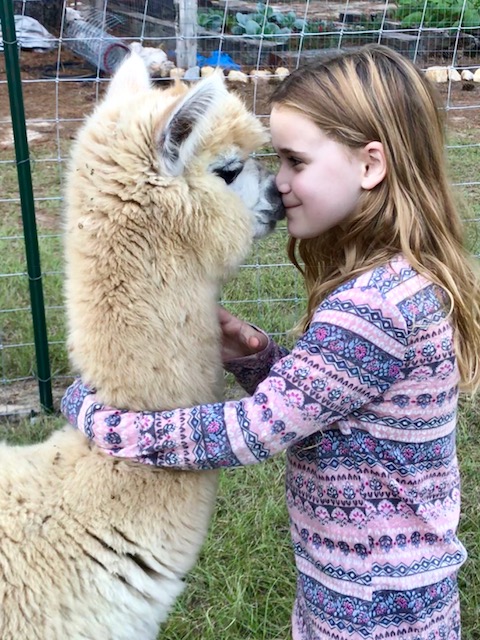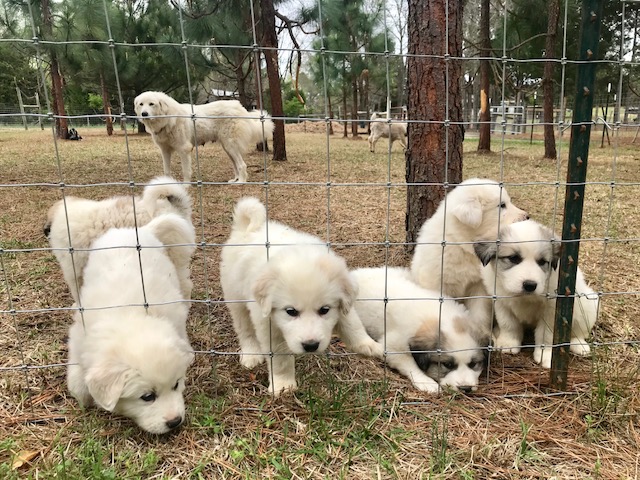
May Vokaty shows off her growing herd of Alpacas. | Ashley Ghere
RIDGEWAY – The Voice’s Foods Editor, May Vokaty, isn’t just a recipe wizard – she’s also an alpaca farmer. She was first smitten with the idea of owning alpacas while on vacation in Coeur D’Alene, Idaho, and then spent a few years researching the logistics. Last October, she finally took the plunge and rented 2½ idyllic acres in Ridgeway for The Alpaca Experience, a pastured farmstead where she tends a herd of fluffy, sweet-natured alpacas, curly-horned angora goats, Heritage chickens and a wriggly litter of Great Pyranees puppies.
Vokaty said she’s delighted that the farm is coming together just like she envisioned – as a productive fiber farm, an educational venue for the public and a farmer’s market offering farm-raised meat and eggs, homemade nut butters and jellies, hand-dyed yarn and fiber-woven accessories like socks, gloves, hats and scarves.
The next Farm Day Farmer’s Market will be held on Saturday, May 5. Vendors’ wares will include handmade sawmill furniture, glass and ceramic mosaics, decorative felted animal figurines, hand-painted wooden home décor, a produce vendor, macramé jewelry, a food truck and more.

Vokaty’s daughter, Elli, 6, smooches a baby alpaca. | May Vokaty
And even the farm’s bumper crop of alpaca manure has become a surprisingly popular purchase at $5 a bag.
“Alpaca manure is low in nitrogen and turns into compost quickly, without having to age much. So you can take it straight from the pasture and put it in your garden. It’s a very practical resource,” she said. “I actually pay my farm rent in manure!”
Held on the first Saturday of every month, Farm Day Farmer’s Markets are open to the public and packed with informative tours, interaction with the animals and learning about farm life. Vokaty plans to continue developing the farm into an educational resource, perhaps as a destination for field trips and as a summer camp. She also hosts events for kids with special needs.
“The atmosphere here is peaceful, and kind of therapeutic in a way,” she said. “A friend of mine has an autistic son, and I noticed how much he enjoys spending time at the farm, just relaxing on a bench in the shade of a tree or spending a few moments petting a gentle, friendly animal. In March, we held an Easter egg hunt here for kids with special needs and their families, and it was a great experience. I’d like to do more events like that, such as harvest festivals in the fall and Christmas things.”
Vokaty said her daughter Elli, 6, is a big help around the farm.
“She’s very involved, and she can do just about anything,” Vokaty said. “We come out to feed the animals every day after she gets home from school, and if I said, Elli, you’ve got to take care of everybody today, she could do it! Of course, it might take her a while…she’s easily distracted by the puppies,” she added with a smile. “Elli especially likes caring for the chickens, and she’s told her classmates that she wants to be either a chicken farmer or a chicken scientist when she grows up,” she said. “I don’t think I could do all this without her.”
And building the alpaca herd, Vokaty said, has been an adventure.

The farm’s Great Pyranees caretaker keeps an eye on her pups. | May Vokaty
“I don’t know that I was ready for the first three,” she said. “I heard about them on Facebook, and went to see them at a farm upstate. They were living in bad conditions, and I knew I couldn’t just leave them, so I bought them and brought them home in a trailer. I had been studying alpacas for three or four years, so when I got the animals, it was like – oh, I know what to do! Although, I didn’t,” she adds with a laugh.
The next three hailed from an area with lots of red clay.
“I call them my orange girls,” she said. “But their color has calmed down considerably now.”
Four male alpacas from North Carolina have rounded out the herd, although the group will be growing again soon since all the females are currently pregnant.
“I’m really interested in fiber,” Vokaty said. “Alpaca fleece is comparable to cashmere – it’s lightweight, very warm, water-resistant, hypoallergenic and doesn’t make you sweat or itch.
But alpaca fiber is ‘greener’ and more environmentally sustainable. Cashmere goats tear up their pasture land and basically reduce it to desert, so the more demand there is for cashmere, the more it destroys the earth. Alpacas are different. Instead of hooves, they have soft pads with toenails, so they don’t tear up the earth. And they’re bigger, so you can get four-six sweaters from one alpaca in a year, while it takes four cashmere goats to make just one sweater. Plus, they eat less than cashmere goats.”
She sends the fleece to an alpaca fiber pool in New England for processing.
“Since there are so few alpaca farmers in the United States, it’s a way for us to pool our fiber together and make it workable for a large mill, like the Pendleton mill that my fiber pool uses,” she said. “If I send them, say, 10 pounds of fleece, then I receive 10 pounds of finished product.”
Any unusable bits and bobs of alpaca fleece are stuffed into “bird balls” that she hangs in trees around the farm to provide grab n’ go nesting material.
Vokaty said that every day on the farm brings something new, whether a big surprise – like a litter of puppies – or more fleeting, like witnessing the alpacas’ delight at being allowed to “clean up the garden” at the end of the season.
“The alpacas are just four-legged stress relievers,” she said. “When I’m out here, in the pasture with the animals and working with them, my stress just seems to go away. It’s a busy lifestyle – there’s always something to do, and you never get any time off – but they just seem to emotionally soothe me, in a way that makes what I’m doing worthwhile.”
More information about The Alpaca Experience is available on the farm’s Facebook page at facebook.com/thealpacaexperience1.











